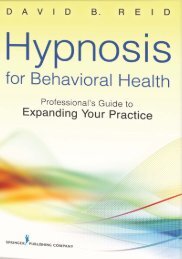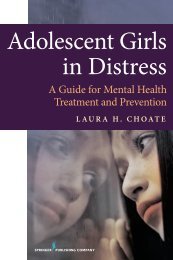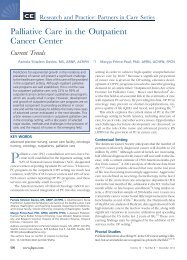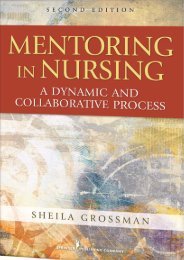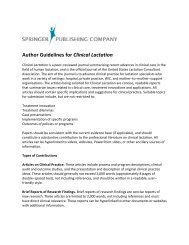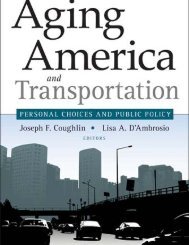social work practice and the law - Springer Publishing
social work practice and the law - Springer Publishing
social work practice and the law - Springer Publishing
Create successful ePaper yourself
Turn your PDF publications into a flip-book with our unique Google optimized e-Paper software.
14 Social Work Practice <strong>and</strong> <strong>the</strong> Law<br />
as causing competition <strong>and</strong> conflict between <strong>social</strong> <strong>work</strong>ers <strong>and</strong> <strong>law</strong>yers<br />
(Fogelson, 1970; Russell, 1988; Smith, 1970). As is <strong>the</strong> case with many o<strong>the</strong>r<br />
professional groups, differences in professional culture <strong>and</strong> how one is<br />
<strong>social</strong>ized during professional education have also been found to contribute<br />
to conflict <strong>and</strong> problems in collaboration for <strong>law</strong>yers <strong>and</strong> <strong>social</strong> <strong>work</strong>ers<br />
(Hall, 2005; Russell, 1988; Taylor, 2006).<br />
Recently, <strong>the</strong>re have been a number of studies suggesting that much<br />
like clients, <strong>social</strong> <strong>work</strong>ers’ actual experience with <strong>the</strong> courts <strong>and</strong> <strong>the</strong> legal<br />
system discourages participation <strong>and</strong> causes <strong>work</strong>ers to challenge <strong>the</strong><br />
legitimacy of those institutions (Ellett & Steib, 2005; Faller, Grabarek, &<br />
V<strong>and</strong>ervort, 2009; V<strong>and</strong>ervort, Gonzalez, & Faller, 2008). These studies<br />
focused on public <strong>and</strong> private child welfare <strong>social</strong> <strong>work</strong>ers <strong>and</strong> case<strong>work</strong>ers<br />
that are in a situation where <strong>the</strong>y must interact frequently with courts<br />
<strong>and</strong> judges who exercise a high degree of control <strong>and</strong> scrutiny over<br />
<strong>the</strong>ir <strong>work</strong>.<br />
Ellett <strong>and</strong> Steib (2005) observed in <strong>the</strong>ir study that at times <strong>the</strong> demeanor<br />
of judges to case<strong>work</strong>ers “seemed unnecessarily disrespectful <strong>and</strong> harsh”<br />
(Ellett & Steib, 2005, p. 344), “courts (judges, parent’s attorneys <strong>and</strong> ADA’s)<br />
tended to treat case<strong>work</strong>ers as functionaries who were expected to provide<br />
documentation <strong>and</strong> services” (Ellett & Steib, 2005, p. 345) <strong>and</strong> “although<br />
problems in legal representation were widely acknowledged <strong>the</strong>y were more<br />
readily attributed to <strong>work</strong>load or inability to compensate attorneys at a<br />
higher level than was <strong>the</strong> case with case<strong>work</strong>ers” (Ellett & Steib, 2005,<br />
p. 348). With case<strong>work</strong>ers <strong>the</strong> tendency was to blame performance problems<br />
on lack of competence or a lack of interest. It was found, however, that<br />
many of <strong>the</strong> <strong>social</strong> <strong>work</strong>ers <strong>and</strong> case<strong>work</strong>ers observed during <strong>the</strong> study<br />
appeared not to underst<strong>and</strong> <strong>the</strong> legal system, know how to write welldocumented<br />
<strong>and</strong> relevant court reports, nor demonstrate <strong>the</strong> ability to effectively<br />
testify in court (Ellett & Steib, 2005).<br />
Faller et al. (2009) studied <strong>the</strong> level of comfort with court proceedings<br />
among child welfare <strong>work</strong>ers at <strong>the</strong> time <strong>the</strong>y began <strong>the</strong>ir employment <strong>and</strong><br />
<strong>the</strong>n again 6 months after employment. An increase in <strong>the</strong> level of comfort<br />
with court proceedings at 6 months was associated with being male, being<br />
White, having an MSW, <strong>and</strong> <strong>work</strong>ing for a private versus public agency<br />
(Faller et al., 2009). Perhaps <strong>the</strong> most troubling finding in this study was <strong>the</strong><br />
decrease in comfort level of professionals of color with court proceedings<br />
after 6 months. The authors voice <strong>the</strong> concern that given <strong>the</strong> overrepresentation<br />
of minority children in <strong>the</strong> child welfare system, a lack of comfort on<br />
<strong>the</strong> part of a large number of <strong>the</strong> professionals charged to advocate for families<br />
may be indirectly related to disparate outcomes for children of color in <strong>the</strong><br />
child welfare system (Faller et al., 2009).<br />
Evidence from <strong>the</strong> studies cited <strong>and</strong> arguments presented from some<br />
<strong>social</strong> <strong>work</strong> educators suggests <strong>the</strong> need for <strong>the</strong> Council on Social Work<br />
Education to require <strong>the</strong> development of courses that consider <strong>social</strong> <strong>work</strong>’s<br />
interface with <strong>the</strong> legal system, teach <strong>the</strong> knowledge <strong>and</strong> skills for <strong>social</strong><br />
<strong>work</strong>ers to be confident <strong>and</strong> empowered actors within <strong>the</strong> legal system, <strong>and</strong><br />
make this a curriculum requirement for all MSW programs (Ellett & Steib,<br />
2005).



